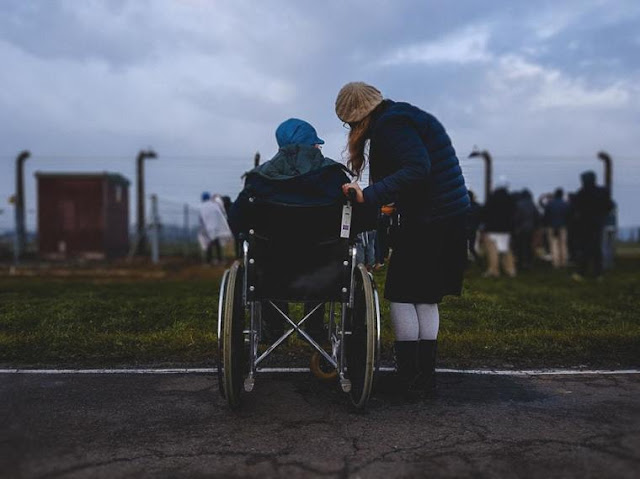Most Protestant pastors and churchgoers believe those with disabilities feel included and welcome at their church, yet fewer actually have a plan in place to accommodate those with special needs, a new study has found.
A survey from Nashville-based LifeWay Research of 1,000 Protestant pastors and 1,002 American Protestant churchgoers found that nearly every pastor (99%) and churchgoer (97%) says someone with a disability would feel welcomed and included at their church.
Almost all pastors (99%) say local churches should make necessary facility modifications to become more accessible to people with physical disabilities even when it is not required by law
Additionally, three-quarters of Protestant pastors (76%) say local churches have a responsibility to provide financial resources and support to individuals with disabilities and their families.
When it comes to action, almost every pastor (95%) says their church is involved in at least one of five different ways to care for those with disabilities and their families, and 75% say their church encourages volunteering in community events for people with disabilities.
Most say they provide financially for families with ongoing needs (70%) or provide respite for family caregivers to give them a break (60%).
However, just half of churches (50%) provide an additional teacher to aid a person with special needs in a class, and only 29% say their church provides classes or events specifically for people with disabilities.
LifeWay also found that larger churches are more likely than others to say they help in many of these specific ways.
While three quarters (75%) of churches with worship attendance topping 250 say they provide such programs, 54% of churches with 100 to 249, 46% of churches with 50 to 99, and 35% of churches with less than 50 say they do the same.
Tim Lucas, the pastor of Liquid Church in Parsippany, New Jersey, told The Christian Post that in general, the “Church is 30 years behind culture when it comes to special needs.”
“[Churches] don’t have the manpower and muscle even if they’re passionate about it,” he said, adding that it takes intentional effort to make families that have special needs feel at home.
In addition to opening a cafe staffed by those with Asperger's, autism, and Down syndrome, Liquid Church provides support to parents of children with special needs through support groups and parents night out events.
The church also employs a “Buddy Program,” where every child with special needs is assigned a buddy who walks with them from fifth grade through high school, ensuring they can participate in all of Liquid Kids environments. Each buddy is trained to meet the unique communication and language needs specific to the child they are assigned.
About 400 families participate in Liquid’s Buddy Program, Lucas estimated, adding that many families travel from all over the state to attend worship while their children participate in the program.
“There was one 10-year-old young man named Grady with Down syndrome, ADHD, and verbal apraxia, meaning the speech messages in his brain didn’t transfer to his mouth,” the pastor recalled. “When his family came to us, they said, ‘We’ve been kicked out of our last three churches. It wasn’t the church’s fault, but they didn’t know what to do with Grady. All three churches treated him as a behavior problem because he was disrupting classes.’”
“People,” Lucas said, “have no idea the toll special needs take on a family. Most people don’t even attend church because their children are seen as a disruption.”
Heather Avis, a mother to three adopted children — two of whom have Down syndrome — shared with CP simple, practical ways the Church can make room for those who typically don’t have a seat at the table.
“When there’s a quiet moment in the church, if you’re not hearing any sounds, then chances are you don’t have people with different abilities in your church,” she said. “Notice who’s not in the room; who is missing in the room.”
Then, make space where everybody belongs.
“The thing with people with different abilities is that everyone is so different. It’s about meeting the needs of the individual where they’re at,” Avis said. “It’s as simple as asking parents, ‘what does your kid need?’ that’s huge.”
“I wish,” she added, “it was as simple as ‘do these five steps to be more inclusive,’ but really that’s not how this community works. It’s about meeting people where they are, creating genuine relationships, and being willing to adjust for the one. It’s the radical idea of, 100 of us are going to shift everything so one person can be a part of our church."
Until the Body of Christ fully embraces those who act, look, and grow a little differently, it won’t experience the fullness of God, Avis contended.
“If we are not allowing people who are different than us to be fully included in our churches, we’re missing out on the fullness of God,” she stressed. “If everyone is like us, whether it be ability or race, we’re missing out on the fullness of God because His image is in each person as they are. There's no asterisk. I believe that until the Church fully embraces those that are different and is intentional in doing so, it doesn’t know fully who God is.”
Read Also:Steffany Gretzinger talks parenting, fear motherhood would get in the way of her devotion to God
Joni Eareckson Tada, whose ministry Joni and Friends provides church training and education to promote inclusion of people with disabilities, told CP that the Church has an obligation to be involved in the lives of those with special needs.
"There is so much talk about mainstream and inclusion in churches. People with disabilities want to belong to a body of Christ," she said. "We want to know that when we don't show up next Sunday for services that somebody is going to miss me. We want to be a friend. We want to have friendships and relationships. We have to get rid of the mechanistic, abstract, dry, theoretical approach to people's needs and really practice Christianity with its sleeves rolled up.”
Tada, who became a quadriplegic after suffering a diving accident over 50 years ago, added: "What changed my life were Christian friends who not only gave me the Word but gave me their time and their love and gave me a chance to go to a movie with them."
"They just befriended me," she added. "We need to practice Christianity with its sleeves rolled up."



.png)
.png)
.png)

.png)
0 Comments